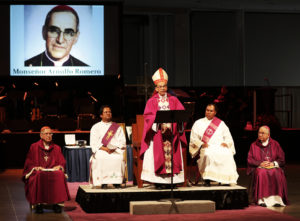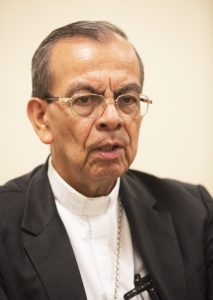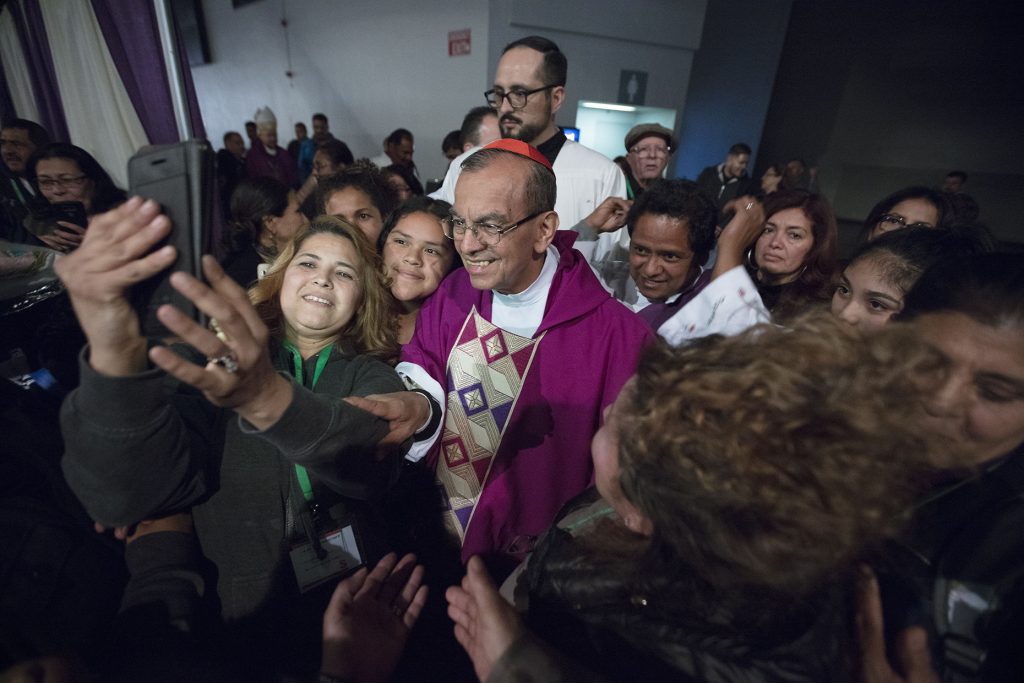When El Salvador’s Cardinal Gregorio Rosa Chavez accepted an invitation to this year’s Religious Education Congress in Anaheim, he had no idea he’d be making the trip to California just days after receiving the news that his close friend Blessed Oscar Romero would be canonized a saint.
Upon arriving in LA, Cardinal Rosa Chavez visited schoolchildren and celebrated Mass at St. Thomas the Apostle Church in Pico-Union, a parish with a large Salvadoran community. Then he headed to the Congress, where he hosted two workshops titled “Justice isn’t enough: Forgiveness is necessary” and “Why is our Holy Father named Francis? A Christian reflection on peace.”
His country's excitement over the official approval of the second miracle needed for the martyr’s sainthood was visible during the cardinal’s interview with Angelus News.
Sharing his thoughts on everything from Temporary Protection Status to President Trump to a “hurricane named Francis,” the Salvadoran cardinal expressed optimism about the benefits that the “gift from God” of Archbishop Romero’s canonization can bring to his troubled homeland and to the Church.
Pablo Kay: How should people prepare for Romero’s canonization?
Cardinal Gregorio Rosa Chavez: This question is so important that we [the bishops of El Salvador] discussed it with the pope when we met with him last March because there was an attitude that his canonization was like having won the lottery. But this is a gift from God, and now this gift has to be merited.
The pope gave us three ways to prepare. First, by getting to know Archbishop Romero. Many have never read his homilies. Second, by following his example. Third, by learning to invoke his intercession, to pray to him. We’re learning to do this.
This is why we weren’t in a hurry. But now that we’ve been told it [the canonization] is imminent, we’re working against the clock. There’s a different atmosphere in the country.
There’s a second point I want to make, which is to achieve peace in the country. The pope believes it can happen, with these three ways [of preparation]. He [Romero] is the only one who can unite the country.
The country can do things that are impossible. We’re the country of impossible things, a country of surprises that can rise from the ashes, that can make peace possible — with Romero at the front.
Kay: Why do you think Pope Francis named you a cardinal?
Cardinal Rosa: When I got to the consistory, they told me, “Never before has an auxiliary bishop been made a cardinal; you’re the first one in history.” He [Pope Francis] broke the rules. If the rules had been followed, I wouldn’t be here talking to you.
So why did he break them? The easy answer is that it has to do with Romero. Since I worked so much for his cause, maybe people associated me with him, so this was a tribute to Msgr. Romero through Msgr. Rosa.
Kay: Why did you decide to come to this year’s Religious Education Congress?
Cardinal Rosa: I didn’t decide, I was invited! I like the formula of this event, and I always enjoy it a lot when I come. I like seeing so many people coming together to prepare themselves. Forty-thousand people are expected this weekend. There is such a varied “menu” of current themes here, especially those of justice and peace. For example, my workshop this year will focus on “Romero and Pope Francis.” This is more or less the theme of my message.
But I’m really happy that this comes after the fifth anniversary of Francis as pope. Because that, combined with the announcement of Romero’s canonization, gives this a context that wasn’t there when they invited me.
Now, we’re all in “Romero mode,” as they say. And in these five years the pope has given us so many joys, but many still haven’t realized who Francis really is. So I will try to help people know who this Francis really is, this hurricane named Francis.

Kay: What can you tell us about the woman healed by the second miracle approved for Archbishop Romero’s canonization?
Cardinal Rosa: The case of this woman is really amazing. I was able to spend a few hours with her family. This woman had had several difficult deliveries and several miscarriages. She was expecting again with a high-risk pregnancy, and they went to Romero’s beatification ceremony in 2015 at his tomb to ask for his intercession.
Meanwhile, as the woman’s husband is holding his grandmother’s bible, a card falls out with a prayer to Romero asking for a grace. So, the Neocatechumenal community of about 40 people to which she belonged began to pray this same prayer.
The doctors eventually discovered that her case had no solution, as she was suffering from HELLP Syndrome. It’s scary just to look up what this illness does to you. There was no way out for her. The best they could do was induce her into a coma, to give her body as much rest as possible.
All of a sudden, this woman begins to react, and the doctors don’t know what’s going on. These doctors kept a very detailed record of her condition during this time — something like a thousand pages — which were sent to Rome along with all the tests they performed on her.
This woman suddenly recovered as if nothing had happened to her. When I see her now with her child, so full of life, and when she talks … it’s hard to believe she was ever sick!
This was a miracle of life, and the medical panel in Rome approved it unanimously as scientifically impossible, as well as the theologians and cardinals involved. It’s amazing to see the hand of God when you hear and see these people.
It was also amazing to see how her community prayed for her like the community of people who prayed for St. Peter when he was imprisoned.
This woman had a spiritual maturity, and the profoundness of the people praying for her was seen after the healing: these people were on a Christian way, and they knew to live this experience discretely and with simplicity, without trying to make a spectacle or trying to be superheroes. And God had mercy!
Kay: When you pray for his intercession, what do you ask of Archbishop Romero?
Cardinal Rosa: I remember the first time that I prayed to him after he was beatified, I felt like I was conversing with the same person I had known, the one I had walked together with so many times. The first time I incensed his image (this was permitted once he was beatified) I got really emotional. I remained looking at him, and I said to him: “Monseñor, gracias a Dios, ya estuvo” (“Monsignor, thanks be to God, it’s done”). That’s when it really hit home: this is the same man I knew since my adolescence, and now I’m incensing a saint. I felt the same emotion when the pope announced his canonization, because Romero is a universal saint…that’s another surprising thing.
Now everyone is talking about the time and place of his canonization. If it’s done together with Paul VI, then it will have to be in Rome. It’s moving to see how the Church has recognized him as a martyr of the [Second Vatican] Council, and this idea is interesting, because he truly lived the Council, and this led to his martyrdom, as a ‘martyr of the magisterium.’ He followed Pope Paul VI faithfully in his teaching of the magisterium — this was his guide — and that’s why they could never find any traces of Marxism in his teachings. Cardinal Ratzinger investigated this. Romero didn’t just take doctrine seriously, but he applied it. Preaching doctrine is easy, but applying it is when the problems come. He took the Church’s preferential option for the poor seriously, and her was martyred for it.
Kay: Youth in El Salvador and here in the United States live in very different environments, and, depending on where they live, can be threatened by things like consumerism, gang violence, poverty, and ideologies which try to replace God. What is your message to youth living in such a world?
Cardinal Rosa: There’s going to be a synod on youth in October. The youth [of El Salvador] have given their own proposals and feedback to the pope in the form of a document, and the greatest danger that they named was social media. The youth of El Salvador! In the document, they describe how today’s youth are captivated by this new technology that they can’t master, and they end up being enslaved by it. To these young people, the threat of violence practically came in second place.
I met a young man recently during a break at a workshop at a kind of vocational school. He was caught between gangs and school. I asked him why her was there. He said, “they don’t yell at me like they do at home. They don’t tell me that I’m a lost cause here. They give me a chance here.” So I asked him a more personal question: “Why are you involved in violence?” He answered: “How can I love if I’ve never felt loved?”
This is so important, with the broken families we have today. Immigration divides families. And now with the expiration of TPS, more families will break apart. This has to be analyzed seriously. Because if the home isn’t saved, there’s no future. Every day, the family is becoming more fragile, and the youth suffer a lot. Even with so much partying, there’s so much suffering when you start to enter into the world of some of these young people.
In El Salvador, many young people are locked in their homes and can’t go out. A kid can’t go down the street to even see his girlfriend, because the gang members are there. This is horrible, to live in a jail in your own country.
Addressing the youth of places where everything is in abundance, Pope Francis has referred to how Jesus loved to share with his disciples around a table, but also with those that the world despised: the sinners, the poor. But what happens today? The youth have lost this sense of “conviviality.” The people don’t share — they get on their little gadgets, and they become absent. So, the pope says, these people are connected, but not communicated.

Kay: With Temporary Protected Status set to end for Salvadoran immigrants in this country, what role should the Church have in this situation?
Cardinal Rosa: First of all, I want to thank Archbishop Gomez for his courage and his clarity on this issue, as well as the U.S. bishops. I was reading his documents [on immigration] on the plane ride here to prepare for our trip [with other Salvadoran bishops] to Washington, D.C., next month.
After a long time of Latinos being marginalized in this country, the strength and rich heritage of Latinos has been discovered by the Church because the world realizes that the future, in large part, depends on us.
That creates new options. There are more and more American bishops who speak Spanish. When I used to travel here years ago, none of them spoke Spanish. None of them had Spanish last names, they were all Irish (laughs)!
The uphill battle we face is to give witness that the Church doesn’t remain silent amid such a dramatic, painful and undeserved moment like the one some are facing now. So I want to thank the Church in the U.S., with whom we’ve been working together for so many years now. This visit to Washington is going to be very emblematic.
Kay: Last year, you went to Korea as an envoy to the peace process there. Now our president, Donald Trump, has agreed to negotiate personally with North Korea’s Kim Jong Un. What advice would you give President Trump?
Cardinal Rosa: First of all, I want to clear up some confusion about this piece of news. It was the Archbishop of Seoul, not the pope, who invited me there to a meeting to discuss how peace agreements are negotiated in South America.
He invited bishops from Mexico, Brazil, Colombia and El Salvador, as well as some lay people too — it was a shared experience. By chance, I happened to be there at the same time as President Trump!
This moment, in which two seemingly similar people say they want to dialogue with the other, can be a surprise from God. It could be something marvelous. But surely, there’s a nostalgia for reconciliation there in the South, and many people want to know what happened to their loved ones in the North. We have to pray for a miracle, because these are two great powers involved here.
But Pope Francis gives the answer to your question. When he was asked about the “wall” during one of his apostolic voyages, he said that we must “build bridges, not put up walls.”
I think that phrase says it all. We can all do something for this, as humble Christians at the base, by building bridges. There are too many walls between people. I think that if the people around him [Trump] can convince him to build bridges, the issue is solved.
Kay: Any clue as to where and when the canonization will take place?
Cardinal Rosa: We, the bishops of El Salvador, sent a letter to the pope two months ago in the hands of the nuncio asking if the canonization could take place in El Salvador so that the poor could participate (this letter has been published, so it’s no longer secret).
If that wasn’t possible, it could perhaps be done during the course of the World Youth Day celebrations in Panama during January of next year. We were told that the Holy Father liked the idea of a stop in El Salvador, that it caught his attention, because technically speaking, he could do a route from the airport to the [Romero’s] tomb, and back to the airport to resume his voyage.
It would be nice if the pope could visit us, and that’s what we all hope for.
This interview was translated from Spanish and edited for brevity.

